Apify Alternatives
Explore 10 Apify alternatives. Our guide compares each tool's features, pricing, and use cases to help you make an informed choice.
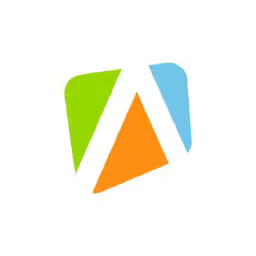
Apify is a popular choice for developers, and for good reason. It performs well for building custom web crawlers and offers strong no-code prospecting features. For these specific tasks, it provides a robust platform that many users find effective for their data extraction needs.
However, some users report a steep learning curve and find the pricing can get complex at scale. We've identified the best alternatives and analyzed their pros and cons against Apify to help you choose. Let's get started.
Consider 11x For Sales Automation
11x provides digital workers for sales teams that want to automate tasks. These workers handle specific functions like prospect identification and initial contact. This allows your team to concentrate on deal closure. Evaluate if this approach suits your sales operation.
11x is a GTM platform that uses AI agents to manage the sales process. We provide an AI worker, Alice, to find prospects, handle outreach on email and LinkedIn, and keep your CRM current.
A second worker, Julian, qualifies inbound leads and books meetings. Our platform consolidates functions, replacing separate tools for data enrichment, outreach, or email warmup.
Apify Alternatives
Below, we review the top Apify alternatives. Each review covers pricing, core features, and a direct comparison of their strengths and weaknesses against Apify to help you decide.
1) Octoparse
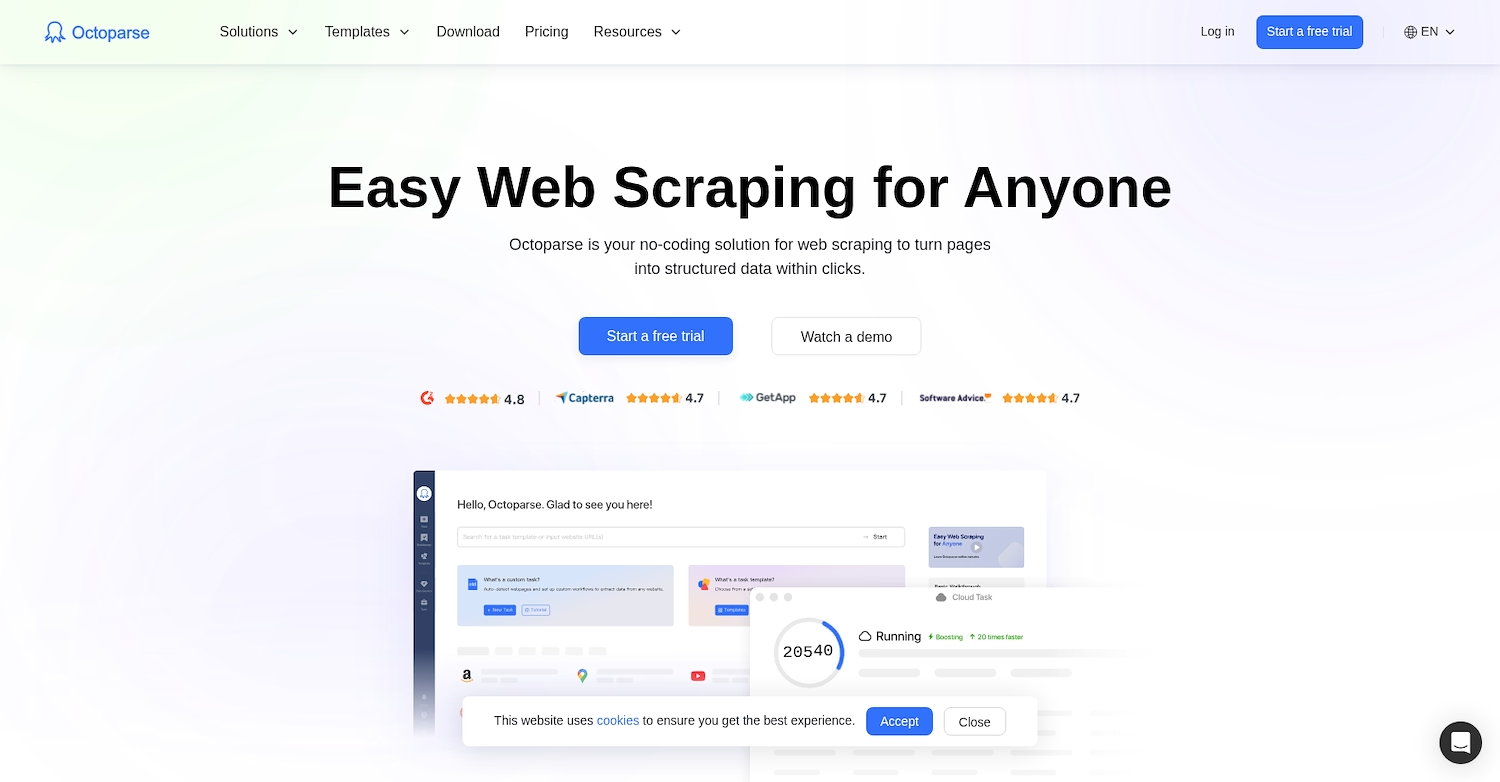
Octoparse provides a no-code tool to turn web pages into structured data. Users build scrapers with a visual, drag-and-drop interface, while an AI assistant helps detect page data automatically. This approach allows non-technical teams to create data extraction jobs without code.
The platform uses its cloud servers to run jobs on a schedule. It can extract contact lists for lead generation or gather competitor pricing for e-commerce intelligence.
Octoparse's Main Features
Provides a no-code workflow designer that uses a visual, drag-and-drop interface to build web scrapers.
Includes an AI web-scraping assistant that auto-detects page data and offers tips to accelerate task creation.
Features a built-in anti-blocking toolkit with IP rotation, CAPTCHA solving, and integrated proxy support.
Offers hundreds of pre-built templates for popular websites to enable data extraction with zero initial setup.
How Octoparse Compares To Apify
Average Review score: 4.8/5 stars based on 52 G2 reviews.
Octoparse provides a visual, point-and-click interface for building scrapers. This approach is more accessible for non-technical users compared to Apify's developer-oriented platform.
It includes hundreds of pre-built templates for popular websites. This allows for immediate data extraction, while Apify generally requires more setup for its scrapers.
The platform features an AI assistant that automatically detects page data. This simplifies task creation, a contrast to the manual configuration often needed in Apify.
Its core design serves users without coding skills. Apify, on the other hand, provides a more powerful but complex environment suited for developers who need to build custom solutions.
Octoparse's Limitations Compared to Apify
Octoparse provides less flexibility for custom scraping logic compared to Apify. Its no-code interface may not support complex websites that require specific scripts, a task where Apify's developer-focused platform excels.
The tool's integration capabilities are more limited than Apify's. Some users may find it difficult to connect Octoparse with other systems, as Apify provides a more robust API for developers to build custom workflows.
It sometimes shows slower performance on large-scale or complex scraping jobs. In contrast, Apify is built to handle heavy workloads, which makes it a more suitable option for users who need to process massive amounts of data.
Pricing and Cost-Effectiveness
Octoparse offers predictable, fixed-tier pricing, including a free version, a $119/month Standard plan, and a $299/month Professional plan. This contrasts with Apify's usage-based model, where costs depend on resource consumption. Octoparse provides budget stability, while Apify may be more economical for smaller or infrequent projects.
2) ParseHub
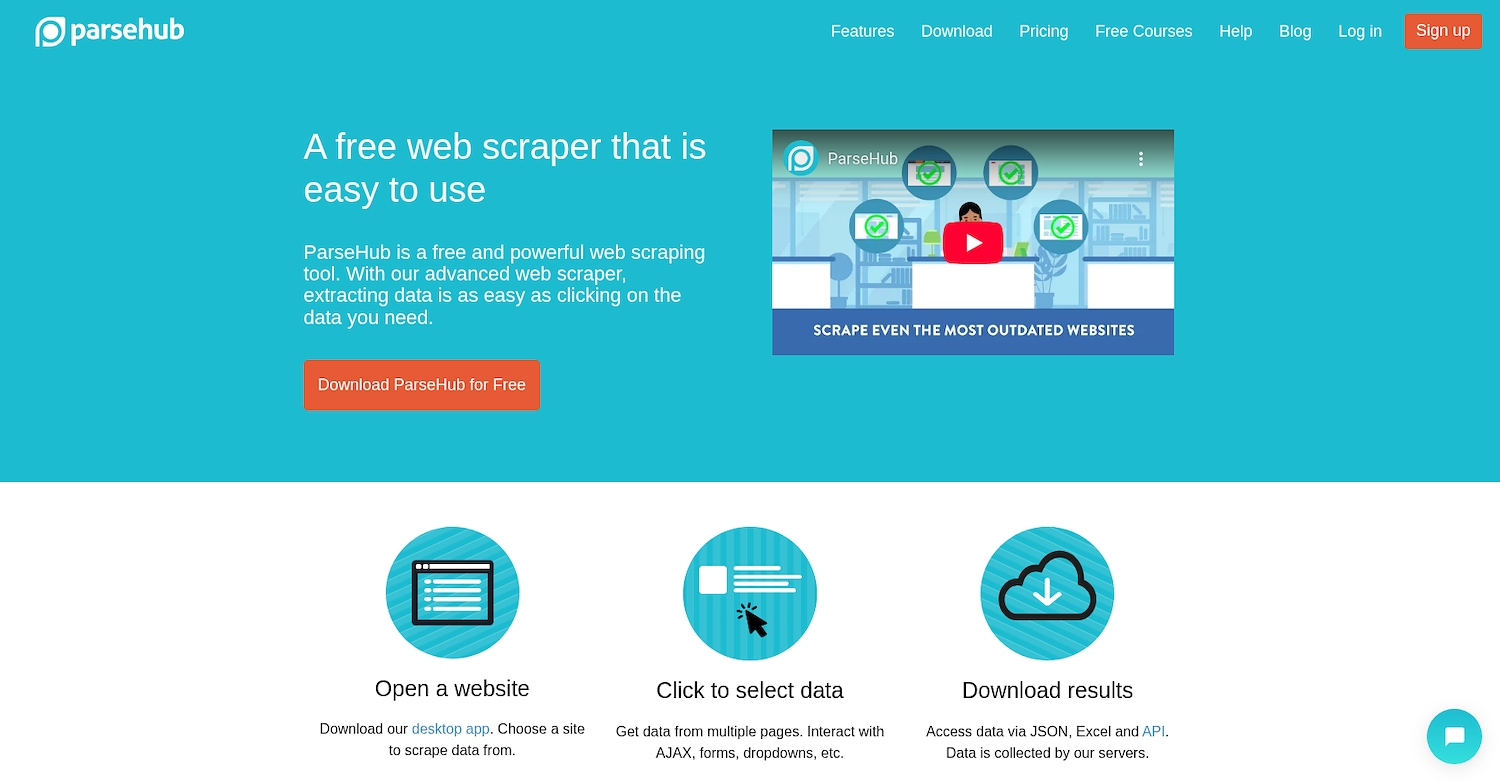
ParseHub is a visual data extraction tool that captures web data without code. It allows teams to build web crawlers for lead generation, price intelligence, and market research. The platform navigates websites, identifies relevant information, and structures it for export. This serves businesses that require web data to find new prospects or perform competitive analysis but lack developer resources.
ParseHub's Main Features
- Provides a visual tool to build scrapers by clicking on website elements, requiring no code.
- Handles interactive websites that rely on JavaScript, AJAX, or infinite scroll through a point-and-click interface.
- Extracts data from forms, dropdowns, and behind login walls by recording actions in the app.
How ParseHub Compares To Apify
Average Review score: 4.3/5 stars based on 10 G2 reviews.
ParseHub uses a visual, point-and-click interface to build scrapers. This is more accessible for non-coders than Apify's developer-centric platform.
It navigates interactive sites with JavaScript or infinite scroll through simple clicks. This same task in Apify often requires custom code.
The tool extracts data from forms and login-protected areas by recording user actions. This is simpler than the scripting required for such tasks in Apify.
Its design is for teams without coding skills. In contrast, Apify offers a more complex environment for developers who build custom solutions.
ParseHub's Limitations Compared To Apify
ParseHub's no-code approach restricts advanced customization. In contrast, Apify allows developers to inject custom JavaScript to handle complex site interactions or data transformations, which is not possible with a purely visual tool.
Its API and webhook options are less extensive than Apify's. This can make it more difficult to build automated workflows that send data directly to other applications, a core feature of the Apify platform.
The platform is not optimized for high-volume, concurrent scraping runs. Apify, on the other hand, is built for parallel processing. It lets users run many tasks at once to gather data much faster.
Pricing and Cost-Effectiveness
ParseHub offers a free plan for small projects, with paid tiers starting at $189/month for the Standard plan and $549/month for the Professional plan. This fixed-tier structure provides cost predictability, unlike Apify's usage-based model where expenses can fluctuate with consumption. For teams with consistent scraping needs, ParseHub's model may offer better budget control.
3) Bright Data
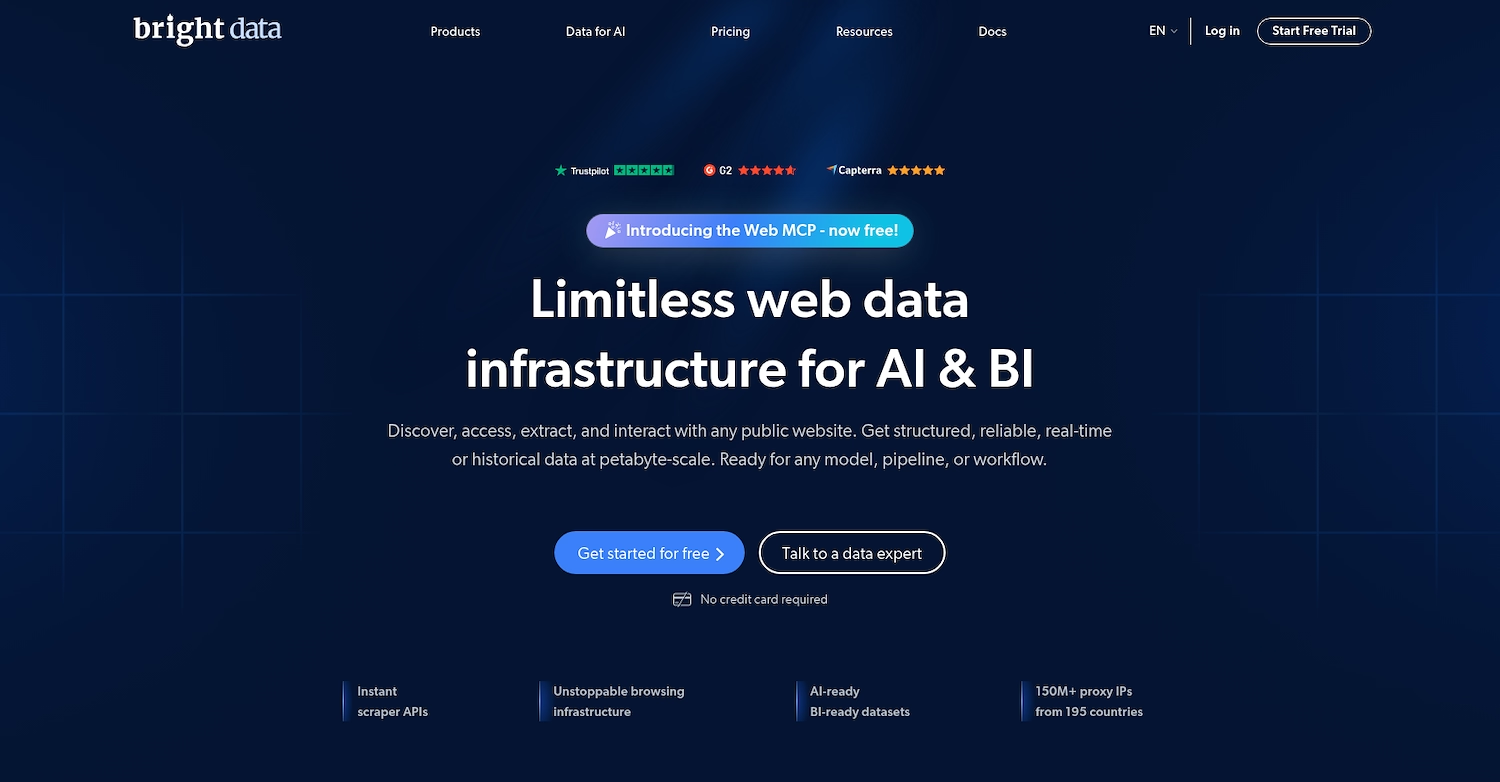
Bright Data is a web data platform with proxy networks and data collection tools to extract public web data. It offers pre-collected datasets and a web scraper IDE for custom crawlers. Companies use it for prospect identification and to collect competitor data at scale.
Bright Data's Main Features
Offers proxy networks to facilitate the collection of public web data.
Provides pre-collected datasets for immediate use in analysis or operations.
Includes a web scraper IDE for building custom data crawlers.
How Bright Data Compares To Apify
Average Review score: 4.6/5 stars based on 248 G2 reviews.
Bright Data provides a vast proxy network with over 72 million residential IPs. This offers more robust options for bypassing blocks compared to the proxy solutions available within the Apify platform.
The platform offers pre-collected datasets for immediate use. This is different from Apify, where users must build and run a scraper to acquire any data.
It allows for granular geo-targeting by city, state, and carrier. This provides more precision than the broader proxy options typically configured in Apify.
This tool emphasizes its GDPR and CCPA compliance. This focus on legal standards is a more prominent feature than in Apify's developer-focused offerings.
Bright Data's Limitations Compared To Apify
Bright Data does not offer a public marketplace of community-built scrapers. This contrasts with Apify's Actor library, which can provide developers with ready-made solutions and accelerate project timelines.
Its Web Scraper IDE provides less coding flexibility for highly complex websites. Apify, on the other hand, allows developers to inject custom JavaScript to manage unique site interactions or data transformations.
The pricing model can be less suitable for individual developers or very small projects. Some users may find Apify's pay-per-use structure more economical for infrequent or low-volume scraping tasks.
Pricing and Cost-Effectiveness
Bright Data's pricing can be complex and may prove more expensive for smaller users than Apify's pay-per-use model. For the most current information, visit Bright Data's official website, as pricing models vary.
4) Zyte
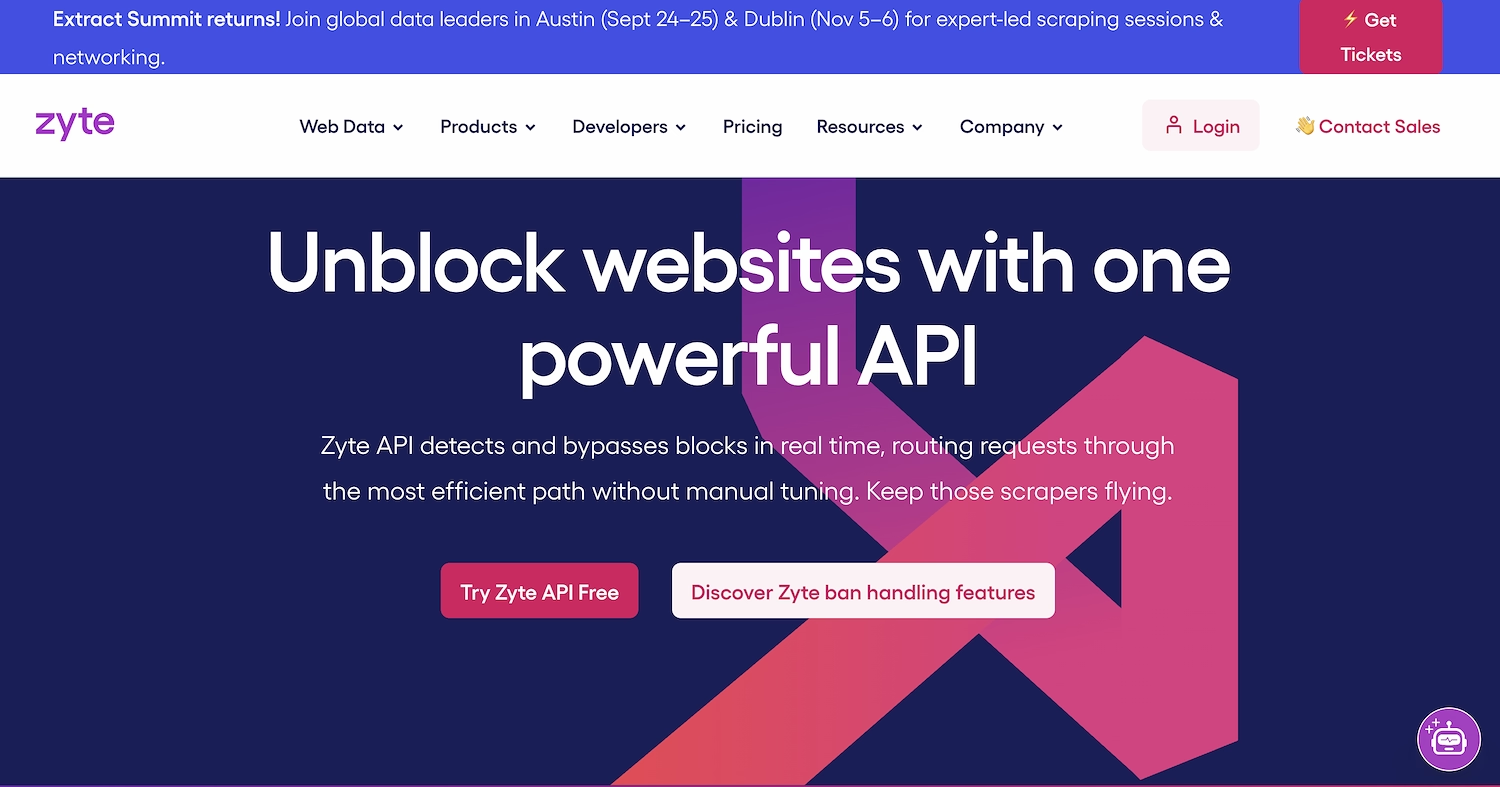
Zyte provides web data extraction services. The company offers tools to crawl websites and collect data, which supports business intelligence and lead generation. Teams evaluate Zyte for its approach to web data, especially for projects that require information for sales prospects or market analysis.
Zyte's Main Features
Offers elastic cloud hosting, monitoring, and automation designed for Scrapy spiders.
Uses patented AI models to parse specific data types such as products, articles, and jobs from web pages.
Provides real-time block detection with automated retries and proxy rotation to manage access issues.
Includes a dedicated legal compliance framework to support data collection operations.
How Zyte Compares To Apify
Average Review score: 4.3/5 stars based on 89 G2 reviews.
Zyte provides native cloud hosting and automation for Scrapy, a popular open-source framework. This offers a familiar environment for Scrapy developers, while Apify operates with its own proprietary Actor system.
The platform includes a dedicated legal framework with an in-house team to advise on data collection laws. This provides a level of compliance support not typically highlighted as a core feature in Apify's developer-focused platform.
It uses AI models to automatically parse specific data types like products or articles from pages. This can reduce manual setup compared to Apify, where structuring extracted data often requires more custom code.
This tool offers a managed data service where its team handles custom scraping projects. This is a different approach from Apify, which primarily provides a platform for users to build and manage their own scrapers.
Zyte's Limitations Compared To Apify
Zyte lacks a public marketplace for community-built scrapers. This is different from Apify's Actor library, which offers ready-made solutions that can accelerate development for common tasks.
Its integration capabilities are sometimes more limited. This can make it more challenging to build automated workflows compared to Apify, which provides a more extensive API for connecting to other applications.
Some users report that the tool can experience slower performance on very large jobs. In contrast, Apify's platform is built for parallel processing, which allows it to handle high-volume, concurrent tasks.
Pricing and Cost-Effectiveness
Zyte offers API access priced per request and managed data services starting at $450 per month. This fixed-tier option provides budget predictability, contrasting with Apify's pay-per-use model, which may be more economical for smaller tasks but can have less predictable costs at scale.
5) Diffbot
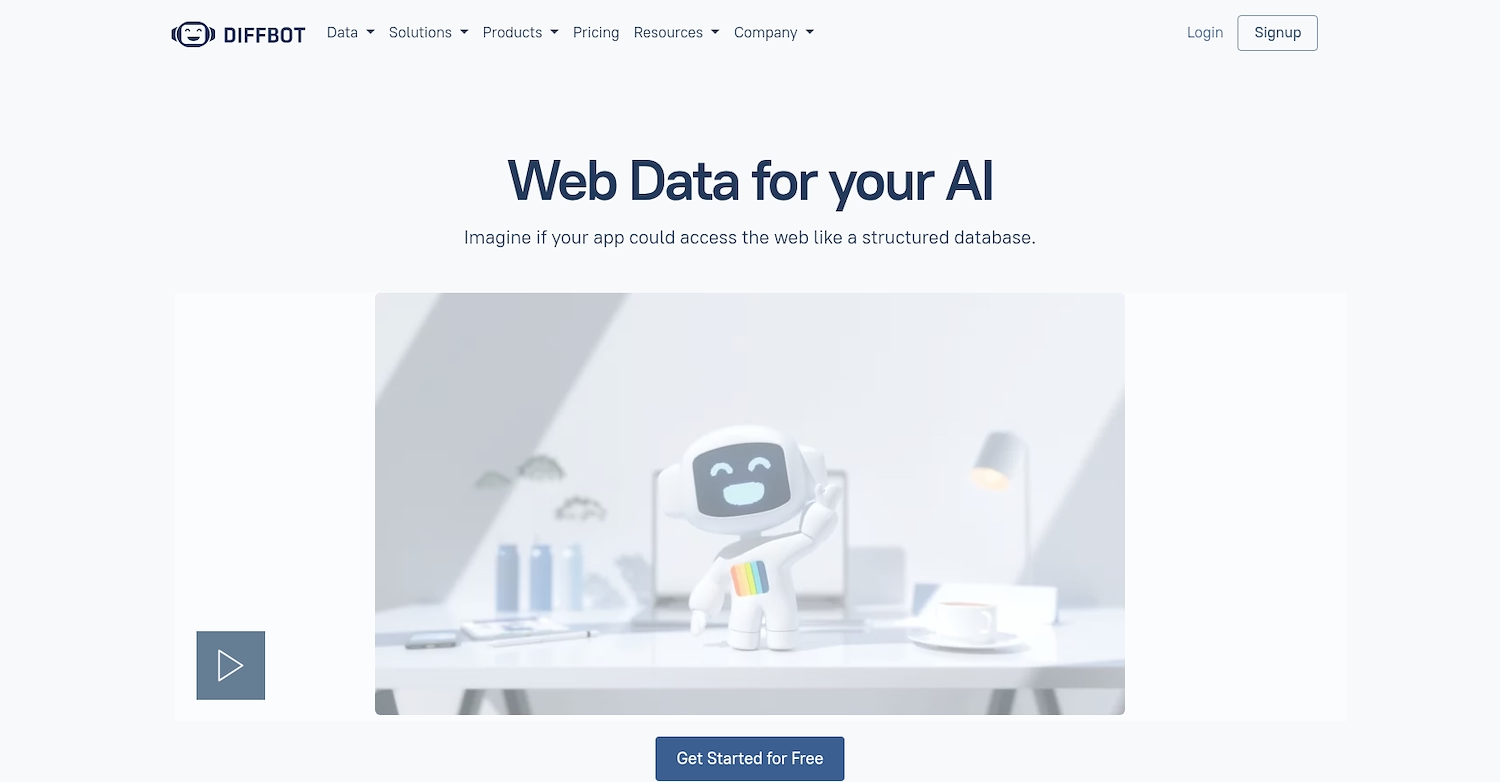
Diffbot uses AI to convert unstructured web pages into structured data. Its tools automate data extraction for use cases like market intelligence and lead discovery. The platform functions as a source of organized information from across the web, which businesses can use to build knowledge graphs or feed applications. This serves teams that need web data for analysis or operations.
Diffbot's Main Features
Provides a Knowledge Graph with over 246 million organizations and 1.6 billion articles to build data feeds and enrich existing datasets.
Uses pre-built data types to extract specific information for organizations, news, retail products, and events, including fields like revenue or sentiment.
Includes a Natural Language API to detect entities, relationships, and sentiment from raw text.
Features a Crawl API that turns any website into a structured dataset of products, articles, or discussions.
How Diffbot Compares To Apify
Average Review score: 4.9/5 stars based on 29 G2 reviews.
Diffbot provides a pre-built Knowledge Graph with billions of entities. This offers a ready-made database, while Apify requires users to build and populate their own datasets from the ground up.
The tool uses machine vision and natural language processing to automatically structure web data. This is different from Apify, where data structuring often needs more manual setup and custom scripts.
It features the Diffbot Query Language (DQL) for precise data extraction. This provides a specialized query method, whereas Apify's platform relies on its Actor system and custom code for data retrieval.
This platform automatically extracts specific data types like products or articles. This can reduce setup time compared to Apify, where users typically define these data structures manually within their scrapers.
Diffbot's Limitations Compared To Apify
Diffbot does not provide a public marketplace for community-built scrapers. This is different from Apify's Actor library, which offers ready-made solutions that can help speed up some projects.
The platform's reliance on automated extraction can sometimes limit control over complex scraping jobs. In comparison, Apify allows developers to inject custom code to handle unique website structures or data formats.
Some users report a learning curve with the Diffbot Query Language (DQL). This might make specific data queries more difficult than in Apify, where developers can use familiar JavaScript for custom logic.
Pricing and Cost-Effectiveness
Diffbot offers fixed-tier plans starting at $299 per month, which provides predictable budgeting for consistent use. This contrasts with Apify's pay-per-use model, where costs are tied to resource consumption and may be more economical for smaller or infrequent projects.
Try 11x for Sales Automation
If your primary need is sales automation over general web scraping, 11x offers a focused solution. Its digital workers manage prospect discovery and outreach. Your sales team can then concentrate on closing deals.
This approach consolidates several functions and can replace separate tools for data or outreach. If this aligns with your operational goals, you can explore how 11x supports sales teams.
At 11x, we use AI to manage your sales process. Our AI worker, Alice, identifies prospects and handles outreach. Julian then qualifies leads and books meetings. We consolidate your GTM stack, replacing separate tools for data, outreach, and email warmup.
Book a demo to see our platform in action.
6) Import.io
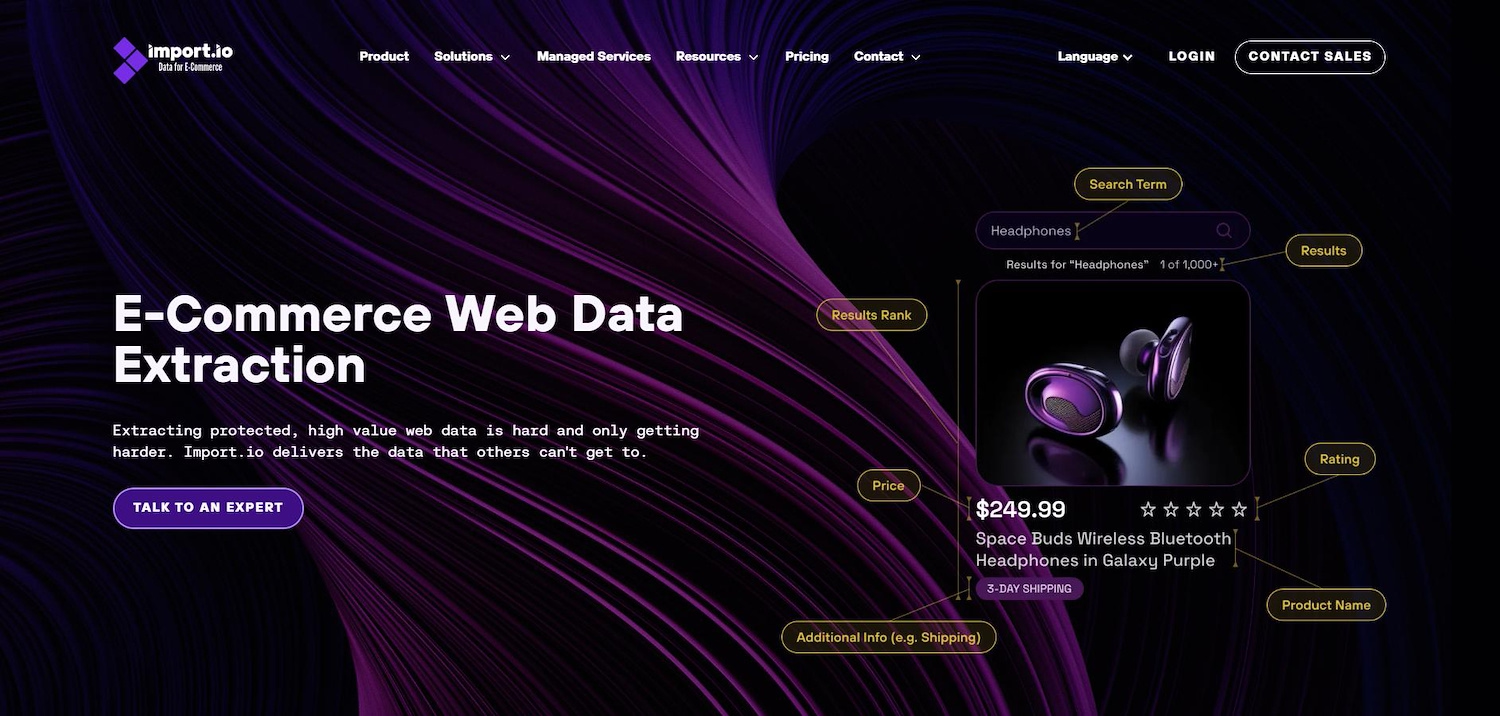
Import.io provides web data extraction tools for businesses. It helps collect information from websites for market research and lead generation. The platform turns web pages into structured data without code, a solution for teams that need web data for analysis but lack technical resources.
Import.io's Main Features
Designs, builds, and maintains bespoke extractors based on client requirements, including issue resolution.
Delivers structured data to any cloud destination or via API, with services to standardize data into a defined dictionary.
Captures specific data types like product details, pricing, inventory levels, and consumer reviews from web pages.
Assigns a dedicated customer success representative for support and provides scheduled reporting and operations monitoring.
How Import.io Compares To Apify
Average Review score: 2.3/5 stars based on 2 G2 reviews.
Import.io offers a managed service where its team builds and maintains custom data extractors. This differs from Apify, which provides a platform for users to build their own solutions.
The platform provides a dedicated customer success representative for each client. This offers a more personalized support model compared to Apify's standard support channels.
It features a point-and-click interface for non-technical users to create data extractors. Apify, in contrast, is a developer-focused platform that often requires code for similar tasks.
This tool offers data standardization services to fit a defined dictionary. On the Apify platform, developers usually handle data structure and cleaning tasks themselves.
Import.io's Limitations Compared To Apify
Import.io's no-code system offers less flexibility for custom data extraction. Apify, in contrast, lets developers use custom code to handle unique websites, a task that can challenge a visual tool.
The platform lacks a public marketplace of pre-built extractors. This is different from Apify's Actor library, which provides ready-made solutions and can accelerate project setup.
Some users find the service can be unreliable, as platform updates might affect existing data extractors. Apify gives developers direct control over their code, which protects projects from vendor-side changes.
Its pricing model is sometimes less suitable for individual developers. Apify's pay-per-use plan can be more cost-effective for smaller or infrequent data extraction tasks.
Pricing and Cost-Effectiveness
Import.io’s pricing is not publicly available, which contrasts with Apify’s pay-per-use model. For the most accurate and up-to-date pricing information, we recommend visiting Import.io's official website.
7) ScraperAPI
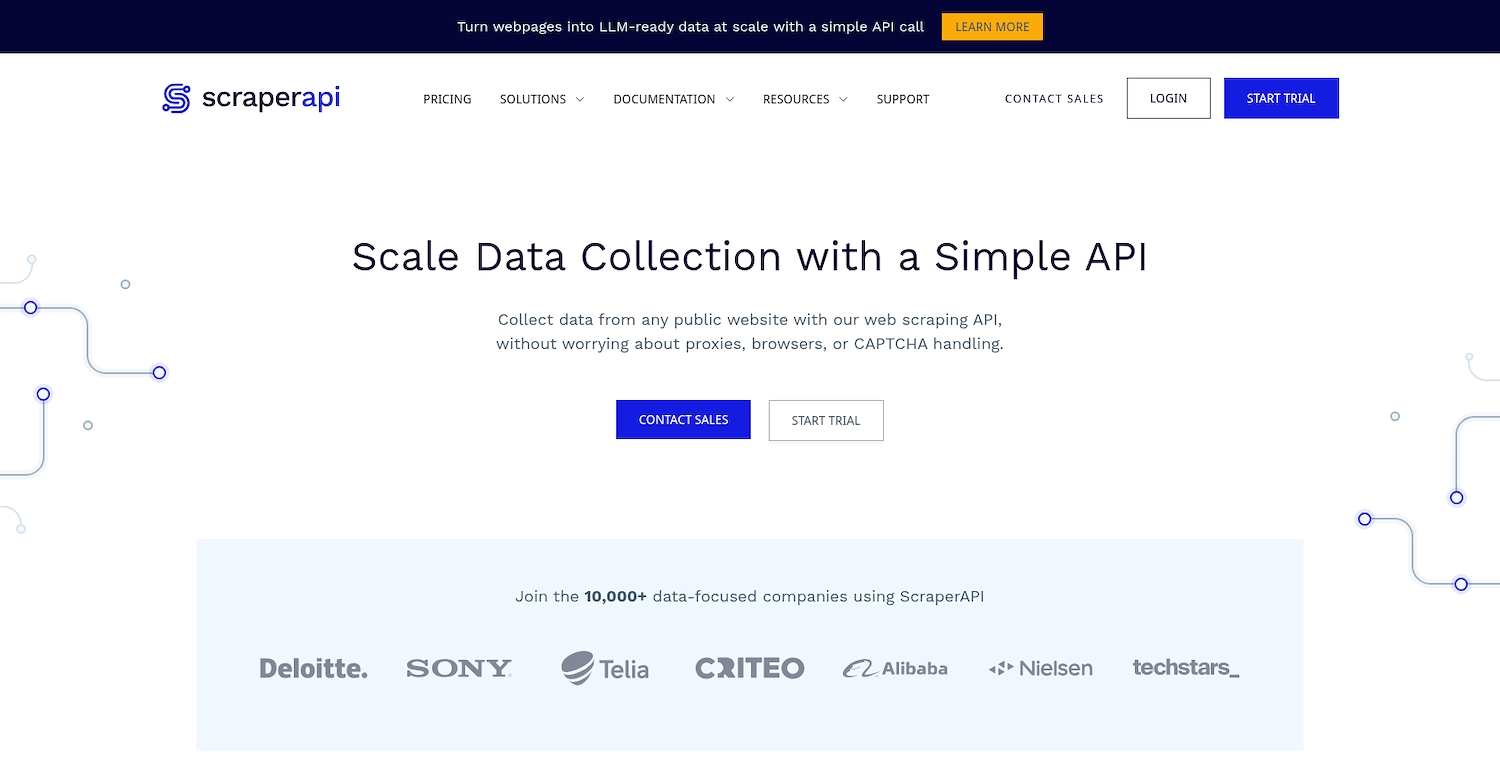
ScraperAPI provides an API to handle proxies, browsers, and CAPTCHAs for web data collection. It lets developers retrieve HTML from any web page with an API call. The service manages the infrastructure to prevent blocks during web crawls.
Companies use it for lead generation and market research. This approach allows teams to concentrate on data analysis rather than access problems.
ScraperAPI's Main Features
Provides structured data endpoints that deliver pre-built JSON for high-demand websites like Amazon and Google Search.
Includes an asynchronous scraper service to manage large-scale jobs by processing millions of requests concurrently.
Offers a low-code workflow tool, DataPipeline, to automate the entire data collection process without writing code.
Supports geotargeting with a pool of over 40 million IPs across more than 50 countries for localized data extraction.
How ScraperAPI Compares To Apify
Average Review score: 4.4/5 stars based on 14 G2 reviews.
ScraperAPI manages proxy rotation and CAPTCHA solving automatically within its API calls. This is different from Apify, where developers often configure proxy settings and integrate CAPTCHA solutions inside their scrapers.
The tool uses a success-based pricing model, charging only for successful API requests. This provides a different cost structure compared to Apify, which bills based on platform resource consumption like CPU and memory.
It offers structured data endpoints that return pre-formatted JSON for some popular websites. In Apify, developers usually write the code to parse and structure the raw HTML themselves.
This service provides an API that handles the scraping infrastructure. This allows developers to focus on the data they need, while Apify offers a platform to build, run, and manage the entire scraping application.
ScraperAPI's Limitations Compared To Apify
ScraperAPI does not provide a public library of community-built scrapers. In contrast, Apify's Actor store gives developers access to many pre-built tools, which can save time on common projects.
The tool abstracts away the scraping process, which can limit control over complex jobs. Apify, on the other hand, allows developers to write and run custom code to handle unique website structures or data parsing needs.
It functions primarily as an API for data retrieval, not a complete development platform. This means it offers fewer tools for building, managing, and monitoring the entire lifecycle of a scraping application compared to Apify.
Pricing and Cost-Effectiveness
ScraperAPI uses a success-based pricing model, charging only for successful requests, which contrasts with Apify's system of billing for platform resource consumption. Since specific pricing details are not publicly available, we recommend visiting ScraperAPI's official website for the most current information.
8) Web Scraper
Web Scraper is a browser extension and cloud platform for data extraction. It allows teams to build scrapers with a point-and-click interface. This serves users who need web data for market research or lead generation but lack developer resources.
Web Scraper's Main Features
Provides a browser extension with a point-and-click interface to build data maps of websites.
Handles dynamic websites that use JavaScript and AJAX to load data, including pagination and infinite scroll.
Offers a cloud platform to run scrapers with scheduling, IP rotation, and API access.
How Web Scraper Compares To Apify
Average Review score: 4.5/5 stars based on 41 G2 reviews.
Web Scraper operates as a browser extension. This provides a more direct and visual way to build scrapers compared to Apify's separate development environment.
It uses a point-and-click interface to select data. This is more accessible for non-technical users than Apify, which often requires code for scraper configuration.
The tool is designed for simplicity and ease of use. In contrast, Apify offers a more powerful but complex platform suited for developers who build custom data extraction applications.
Web Scraper's Limitations Compared to Apify
The point-and-click system may offer less flexibility for websites with unusual structures. Apify allows developers to write custom code to handle such edge cases.
Its cloud service may not match the performance of Apify for very large, concurrent scraping jobs. Apify's platform is built for parallel processing at scale.
Web Scraper does not have a public marketplace of community-built scrapers. This is different from Apify's Actor store, which provides ready-made solutions for common tasks.
Pricing and Cost-Effectiveness
Web Scraper offers a free browser extension and tiered cloud plans starting at $50 per month. This fixed pricing provides cost predictability for regular use. It contrasts with Apify's usage-based model, which can be more economical for smaller or less frequent scraping tasks.
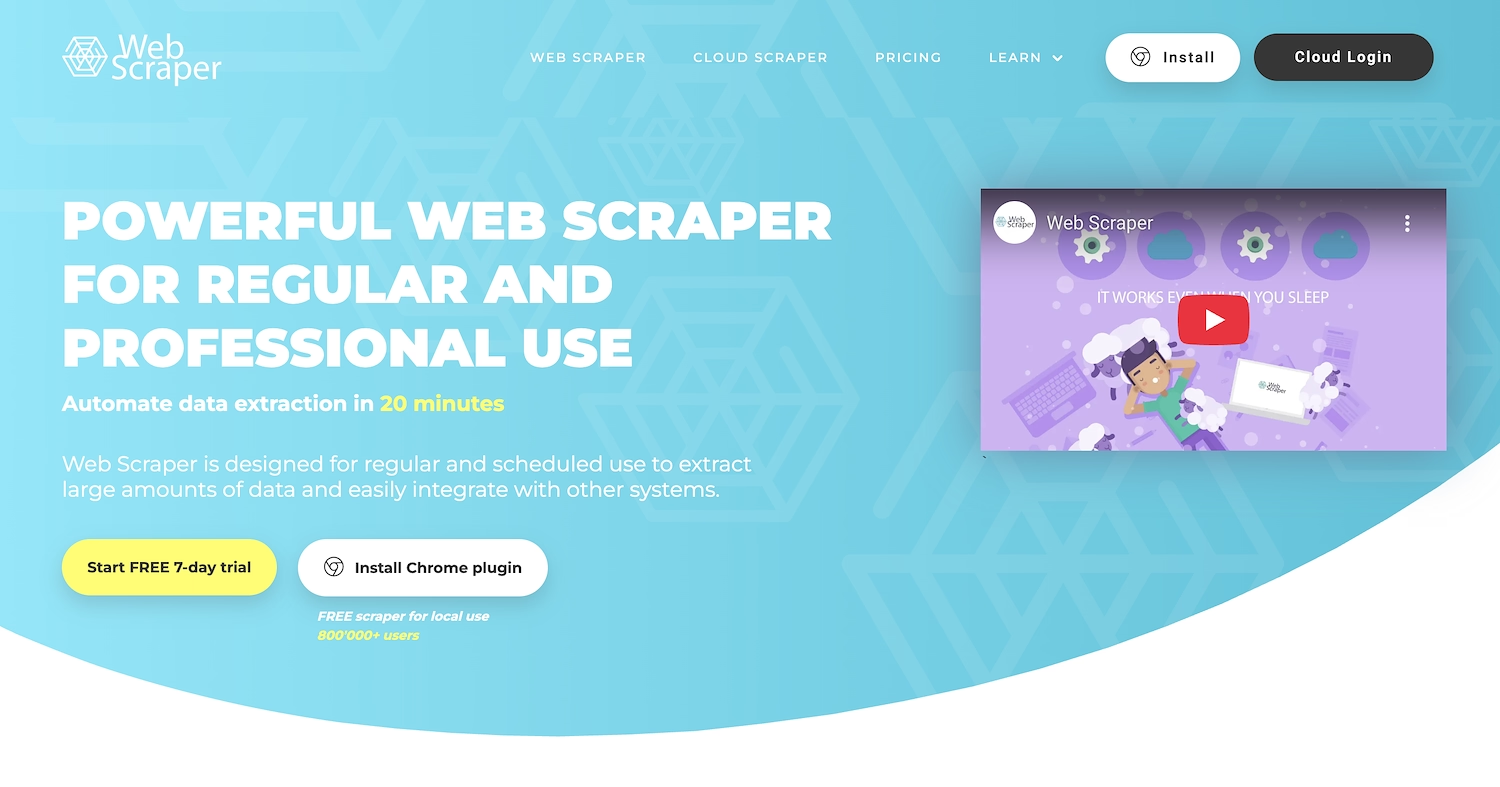
Web Scraper is a browser extension and cloud platform for data extraction. Teams build web crawlers with a point-and-click interface for no-code prospect discovery. The tool helps users collect web data for market research or lead generation, and it does not require developer resources.
Web Scraper's Main Features
Provides a free Chrome extension with a point-and-click interface to scrape dynamic web pages.
Exports extracted tables and lists directly into CSV or Excel formats for data mining.
Saves scraping configurations for later use and schedules data crawls to run at set times.
How Web Scraper Compares To Apify
Average Review score: 4.4/5 stars based on 4 G2 reviews.
Web Scraper works as a browser extension, which offers a visual way to build scrapers directly on a website. This is different from Apify, which operates as a separate development platform.
It uses a point-and-click interface to select data, which is more direct for non-technical users. In Apify, this same task often requires writing code to define the data selectors.
The tool exports data directly to a CSV file, which simplifies data mining for business users. Apify requires additional steps or scripts to format and download data into a specific file type.
Its free version is a Chrome extension with full manual scraping features. Apify's free tier, in comparison, is based on platform usage credits, which limits the volume of data you can process.
Web Scraper's Limitations Compared To Apify
The tool's integration options are more limited. It primarily exports to files, while Apify's API allows direct connections to other business applications and databases for automated workflows.
It offers fewer tools for monitoring and managing scraping jobs. Apify provides a full platform with detailed logs and controls for developers to oversee the entire application lifecycle.
Complex data transformations can be difficult to perform within the tool. In contrast, Apify allows developers to use custom scripts to clean and format data during the scraping process.
Pricing and Cost-Effectiveness
Web Scraper offers a free browser extension, while its cloud platform operates on a fixed-tier subscription model. This provides cost predictability, which contrasts with Apify's usage-based pricing where expenses are tied to resource consumption.
9) PhantomBuster
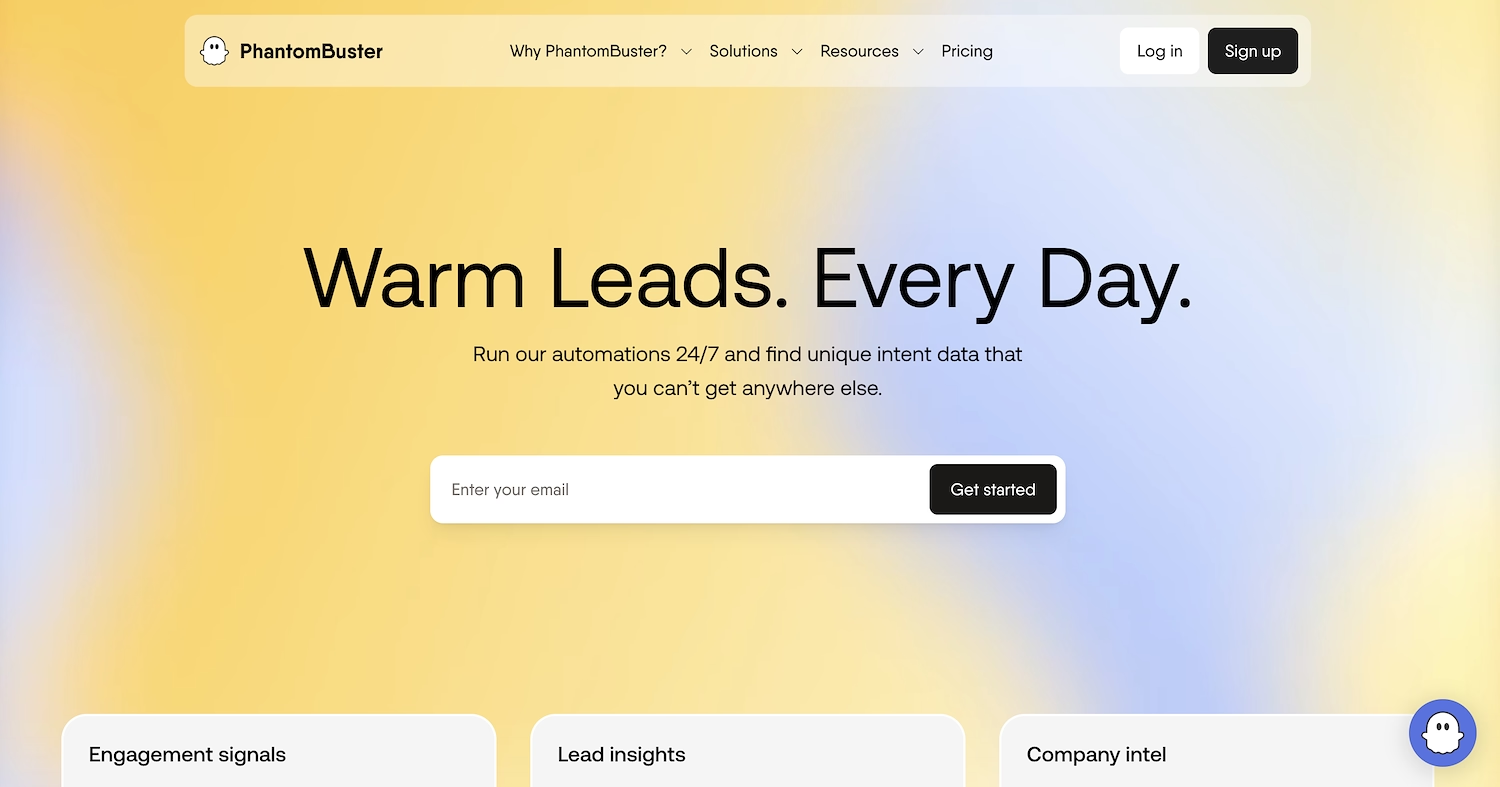
PhantomBuster provides code-free automation tools for sales and marketing teams. It extracts data from websites and social platforms to support lead generation. The platform uses pre-built automations, called Phantoms, for tasks like data scraping or contact enrichment.
This allows businesses to build data collection workflows for their growth operations without developer support.
PhantomBuster's Main Features
Provides pre-built automations, called Phantoms, to build advanced workflows without writing code.
Scrapes data from social networks and websites, including LinkedIn, Sales Navigator, and Google Maps.
Automates actions to interact with prospects and enriches CRM systems with clean data.
How PhantomBuster Compares To Apify
Average Review score: 4.3/5 stars based on 97 G2 reviews.
PhantomBuster provides pre-built automations, called Phantoms, for specific sales and marketing tasks on social media. This is different from Apify’s Actor library, which contains more general-purpose scrapers built by developers.
It specializes in scraping data from social networks like LinkedIn, Sales Navigator, and Instagram. In contrast, Apify is a general data extraction platform designed for any website, not focused on specific social platforms.
The tool automates interactive tasks, such as sending connection requests to prospects. Apify's platform primarily focuses on data extraction and does not include built-in features for social media interaction.
Users can build data collection and outreach workflows without writing code. This approach is more direct for sales teams compared to Apify, which requires development knowledge to create custom scrapers.
PhantomBuster's Limitations Compared To Apify
PhantomBuster focuses on social media platforms, which can limit its use for scraping diverse websites. Apify, in contrast, is a general-purpose platform that allows developers to build scrapers for any site, regardless of its complexity.
The tool's pre-built Phantoms offer less flexibility for custom tasks. This is different from Apify, where developers can write their own code to handle unique data extraction challenges or complex website structures.
It does not have a public marketplace for community-built automations. This contrasts with Apify's Actor store, which provides access to many pre-built scrapers that can reduce development time for common projects.
Pricing and Cost-Effectiveness
PhantomBuster offers fixed-tier subscription plans, which contrasts with Apify's pay-per-use model. For the most accurate and up-to-date pricing information, we recommend visiting PhantomBuster's official website.
10) DataMiner
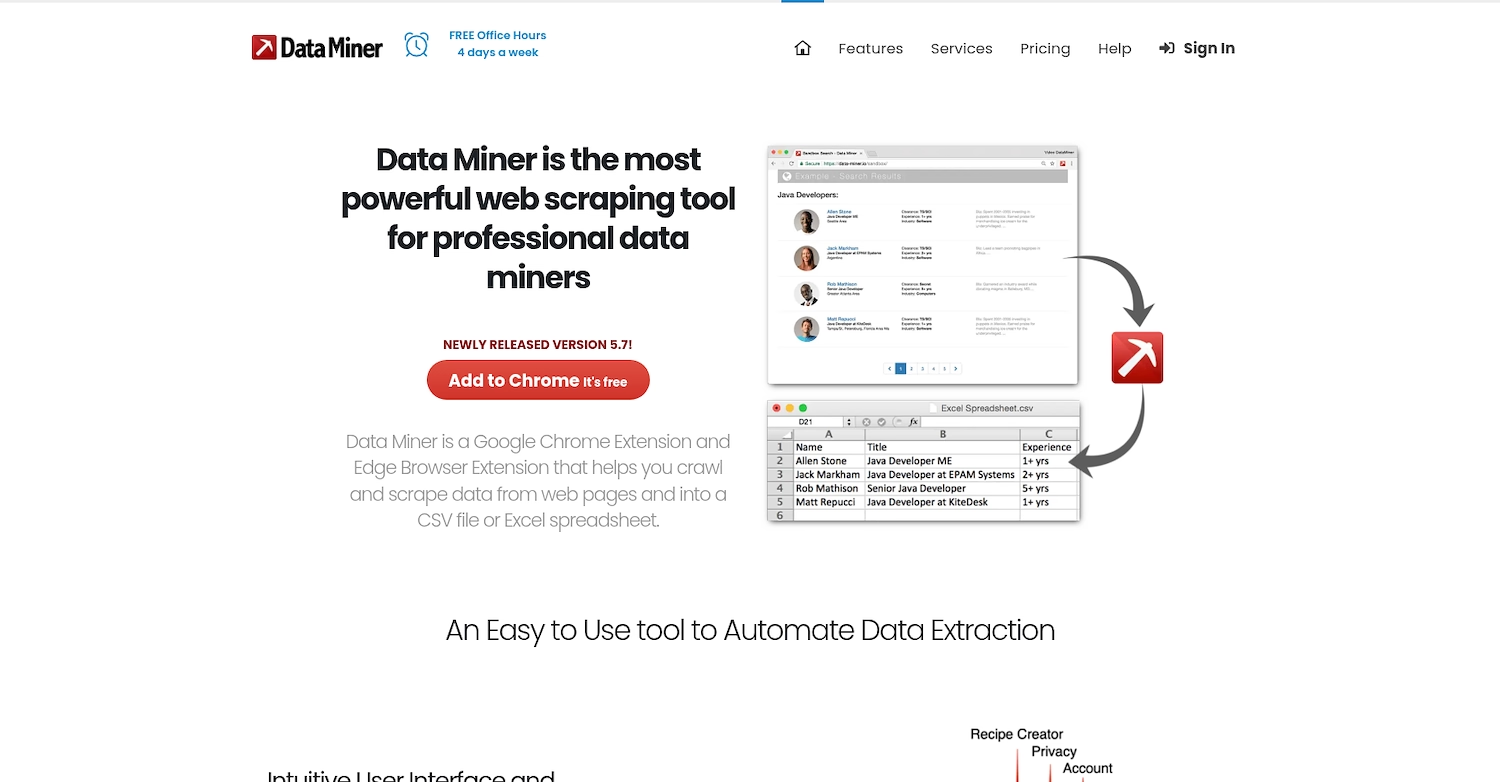
DataMiner is a browser extension that extracts data from web pages. It scrapes information from tables and lists on a single page or through multi-page crawls. The tool uses custom extraction rules, called recipes, to identify and collect specific data fields. This method supports data collection for market research or lead generation without code, for teams that require web data for analysis.
DataMiner's Main Features
Uses customizable scraping recipes to automate data extraction without requiring code.
Offers direct integration with Salesforce CRM to manage extracted data.
Includes built-in templates that allow for quick setup of scraping jobs.
How DataMiner Compares To Apify
Average Review score: 4.7/5 stars based on 8 G2 reviews.
DataMiner uses customizable scraping recipes, which can simplify data extraction for users without coding skills. This is different from Apify, where developers often write custom scripts to define data collection rules.
It offers direct integration with Salesforce CRM, allowing for a more straightforward data transfer process. In Apify, connecting to a CRM typically requires custom development using its API.
The tool functions as a browser extension, which lets users build scrapers visually on a webpage. Apify, in comparison, operates as a separate development platform that requires more setup.
DataMiner includes built-in templates for quick job configuration. This can be more direct for specific tasks than searching Apify's Actor store for a suitable pre-built solution.
DataMiner's Limitations Compared To Apify
DataMiner's recipe-based system might not handle very complex websites. Apify, in contrast, allows developers to write custom JavaScript to manage unique site structures or data parsing, which offers more control.
The tool's browser-based nature can sometimes lead to performance issues on very large scraping jobs. In comparison, Apify's platform is designed for cloud-based, parallel execution, which helps manage heavy workloads more effectively.
It does not offer a public marketplace for community-built scrapers. This is different from Apify's Actor store, which provides developers with many ready-made solutions that can save time on common projects.
Some users report that extracted data can sometimes have inconsistencies that require manual cleaning. Apify allows developers to build data validation steps directly into the scraper's code, which can improve the quality of the final dataset.
Comparing Cost-Effectiveness
DataMiner’s pricing is page-based, which can become costly for high-volume jobs, and contrasts with Apify's pay-per-use model where costs are tied to resource consumption. For the most accurate pricing, we recommend visiting DataMiner's official website.
Which One Should You Go With?
Choosing the right Apify alternative depends on your specific needs, technical resources, and budget. This guide reviewed several options to help you evaluate which tool best fits your operational requirements.
If your goal is sales automation rather than general web scraping, consider 11x. Our platform provides digital workers to manage prospect discovery, outreach, and lead qualification. This allows your sales team to focus on closing deals instead of manual data tasks.




